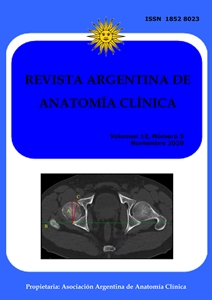SEX DIFFERENCES IN THE ANTERIOR ACETABULAR RIDGE MORPHOLOGY
DOI:
https://doi.org/10.31051/1852.8023.v12.n3.29979Keywords:
sex differences, anterior acetabular ridge, curvedAbstract
Objectives: The anterior acetabular ridge morphology, an important consideration in the design of hip prosthesis, shows marked interethnic variability. There is however a paucity of local data highlighting the prevalence of the various anterior acetabular ridge shapes. Furthermore, sex-related differences have hardly been documented. Therefore, this study aimed to determine the shapes of the anterior acetabular ridge in a sample Kenyan population and the sex differences therein. Methods: Ninety-four paired hip bones (44 female, 50 male) from the osteology collection at the National Museums of Kenya were studied. The shape of the anterior acetabular ridge was determined and recorded. Results: The anterior acetabular ridge was curved in 34% of cases, straight in 24.5%, angular in 21.3% and in irregular 20.2% of the cases. The curved type was more frequent in females (50.0%) compared to males (20.0%). Conclusion: Sexual dimorphism influences anterior acetabular ridge morphology and which should be borne in mind during acetabular reconstructive procedures and design of acetabular prosthesis.
References
Aksu FT, Ceri NG, Arman C, Tetik S. 2006. Morphology and morphometry of the acetabulum. DEÜ Tip Fakültesi Dergisi 20:143-48.
Atkinson HD, Johal K S, Willis-Owen C, Zadow S, Oakeshott RD. 2010. Differences in hip morphology between the sexes in patients undergoing hip resurfacing. Journal of orthopaedic surgery and research, 5:76.
Delaunay S, Dussault RG, Kaplan PA, Alford BA. 1997. Radiographic measurements of dysplastic adult hips. Skeletal radiology 26:75-81.
Govsa F, Ozer MA, Ozgur Z. 2005. Morphologic features of the acetabulum. Archives of orthopaedic and trauma surgery 125:453-461.
Hur YM, Kaprio J, Iacono W, Boomsma D, McGue M, Silventoinen K, Martin N, Luciano M, Visscher P, Rose R, He M, Ando J, Ooki S, Nonaka K, Lin C, Lajunen H, Cornes B, Bartels M, van Beijsterveldt C, Cherny S, Mitchell K. 2008. Genetic influences on the difference in variability of height, weight and body mass index between Caucasian and East Asian adolescent twins. Int J Obes (London) 32:1455–1467.
Imber CE 2004. Robusticity and rugosity in the modern human skeleton. Doctoral dissertation, University of London.
Jordaan HV. 1976. The differential development of the hominid pelvis. South African medical journal 744-748.
Kigera JWM, Owira P, Saidi H. 2017. Scaphoid dimensions and appropriate screw sizes in a Kenyan population. East African Orthopaedic Journal 11:3-5.
Kopydlowski NJ, Tannenbaum EP, Smith MV, Sekiya JK. 2014. Characterization of human anterosuperior acetabular depression in correlation with labral tears. Orthopaedic journal of sports medicine 2:2325967114551328.
Krebs V, Incavo SJ, Shields WH. 2009. The anatomy of the acetabulum: what is normal? Clinical orthopaedics and related research 467:868-875.
Lavy CBD, Msamati BC, Igbigbi PS. 2003. Racial and gender variations in adult hip morphology. International orthopaedics 27:331-333.
Loder RT, Skopelja EN. 2011. The epidemiology and demographics of hip dysplasia. ISRN orthopedics
Maruyama M, Feinberg JR, Capello WN, D'Antonio JA. 2001. Morphologic features of the acetabulum and femur: anteversion angle and implant positioning. Clinical Orthopaedics and Related Research 393:52-65.
Msamati BC, Igbigbi PS, Lavy CBD. 2003. Geometric measurements of the acetabulum in adult Malawians: radiographic study. East African medical journal 80:546-549.
Murtha PE, Hafez MA, Jaramaz B, DiGioia Iii AM. 2008. Variations in acetabular anatomy with reference to total hip replacement. The Journal of bone and joint surgery. British volume 90:308-313.
Pollard CD, Sigward SM, Powers CM. 2007. Gender differences in hip joint kinematics and kinetics during side-step cutting maneuver. Clinical Journal of Sport Medicine 17:38-42.
The World Factbook. URL: https://www.cia.gov/library/publications/the-world-factbook/fields/2018.html (Accessed December 2018).
Ukoha UU, Umeasalugo KE, Okafor JI, Ndukwe GU, Nzeakor HC, Ekwunife DO. 2014. Morphology and morphometry of dry adult acetabula in Nigeria. Rev Arg de Anat Clin 6:150-155
Umer M, Thambyah A, Tan WTJ, De SD. 2006. Acetabular morphometry for determining hip dysplasia in the Singaporean population. Journal of Orthopaedic Surgery 14:27-31
Vandenbussche E, Saffarini M, Delogé N, Moctezuma JL, Nogler M. 2007. Hemispheric cups do not reproduce acetabular rim morphology. Acta orthopaedica 78:327-332.
Vandenbussche E, Saffarini M, Taillieu F, Mutschler C. 2008. The asymmetric profile of the acetabulum. Clin Orthop Relat Res 466:417-423.
Vyas K, Shroff B, Zanzrukiya K. 2013. An Osseous Study of Morphological Aspect of Acetabulum of Hip Bone. International Journal of Research in Medical Sciences 2:78-82.
Wang SC, Brede C, Lange D, Poster CS, Lange AW, Kohoyda-Inglis C, Sochor MR, Ipaktchi K, Rowe SA, Patel S, Garton HJ. 2004. Gender differences in hip anatomy: possible implications for injury tolerance in frontal collisions. Annu Proc Assoc Adv Automot Med 48:287-301.
Wolf JM, Cannada L, Van Heest AE, O’Connor MI, Ladd AL. 2015. Male and female differences in musculoskeletal disease. Journal of the American Academy of Orthopaedic Surgeons 23:339-347.
Zeng Y, Wang Y, Zhu Z, Tang T, Dai K, Qiu S. 2012. Differences in acetabular morphology related to side and sex in a Chinese population. Journal of anatomy 220:256-262.
Downloads
Published
Issue
Section
License
Copyright (c) 2020 Fidel O. Gwala, Dr Jeremiah Munguti, Dr Kevin Ongeti, Dr Kirsteen Awori

This work is licensed under a Creative Commons Attribution-NonCommercial 4.0 International License.
Authors retain copyright and grant the journal right of first publication with the work simultaneously licensed under a Creative Commons Attribution License that allows others to share the work with an acknowledgement of the work's authorship and initial publication in this journal. Use restricted to non commercial purposes.
Once the manuscript has been accepted for publications, authors will sign a Copyright Transfer Agreement to let the “Asociación Argentina de Anatomía Clínica” (Argentine Association of Clinical Anatomy) to edit, publish and disseminate the contribution.



